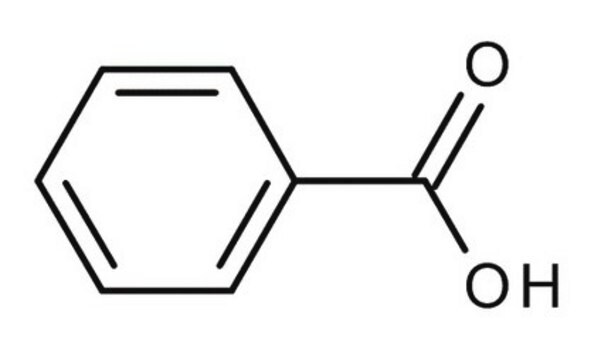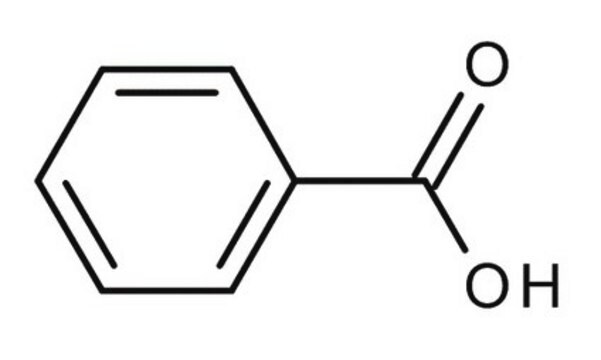33047
Benzoic acid
puriss. p.a., ACS reagent, reag. Ph. Eur., ≥99.9% (alkalimetric)
Sinónimos:
Benzenecarboxylic acid, Carboxybenzene
About This Item
Productos recomendados
grade
ACS reagent
puriss. p.a.
Quality Level
agency
reag. Ph. Eur.
vapor density
4.21 (vs air)
vapor pressure
10 mmHg ( 132 °C)
assay
≥99.9% (alkalimetric)
form
crystalline
autoignition temp.
1061 °F
impurities
readily oxidisable substances, in accordance
≤0.002% S-compounds (as S)
≤0.005% halogen compounds (as Cl)
≤0.005% insoluble in methanol
ign. residue
≤0.005% (as SO4)
bp
249 °C (lit.)
mp
121-125 °C (lit.)
solubility
water: soluble (2.9 g/l at 25 °C)
anion traces
sulfate (SO42-): ≤20 mg/kg
cation traces
Cu: ≤5 mg/kg
Fe: ≤5 mg/kg
Pb: ≤2 mg/kg
Zn: ≤5 mg/kg
functional group
carboxylic acid
phenyl
SMILES string
OC(=O)c1ccccc1
InChI
1S/C7H6O2/c8-7(9)6-4-2-1-3-5-6/h1-5H,(H,8,9)
InChI key
WPYMKLBDIGXBTP-UHFFFAOYSA-N
¿Está buscando productos similares? Visita Guía de comparación de productos
General description
Application
- paints
- pigments
- varnish
- wetting agents
- aroma compounds
- benzoyl chloride
- benzotrichloride
signalword
Danger
hcodes
Hazard Classifications
Eye Dam. 1 - Skin Irrit. 2 - STOT RE 1 Inhalation
target_organs
Lungs
Storage Class
6.1C - Combustible acute toxic Cat.3 / toxic compounds or compounds which causing chronic effects
wgk_germany
WGK 1
flash_point_f
Not applicable
flash_point_c
Not applicable
ppe
dust mask type N95 (US), Eyeshields, Faceshields, Gloves
Elija entre una de las versiones más recientes:
¿Ya tiene este producto?
Encuentre la documentación para los productos que ha comprado recientemente en la Biblioteca de documentos.
Los clientes también vieron
Nuestro equipo de científicos tiene experiencia en todas las áreas de investigación: Ciencias de la vida, Ciencia de los materiales, Síntesis química, Cromatografía, Analítica y muchas otras.
Póngase en contacto con el Servicio técnico








